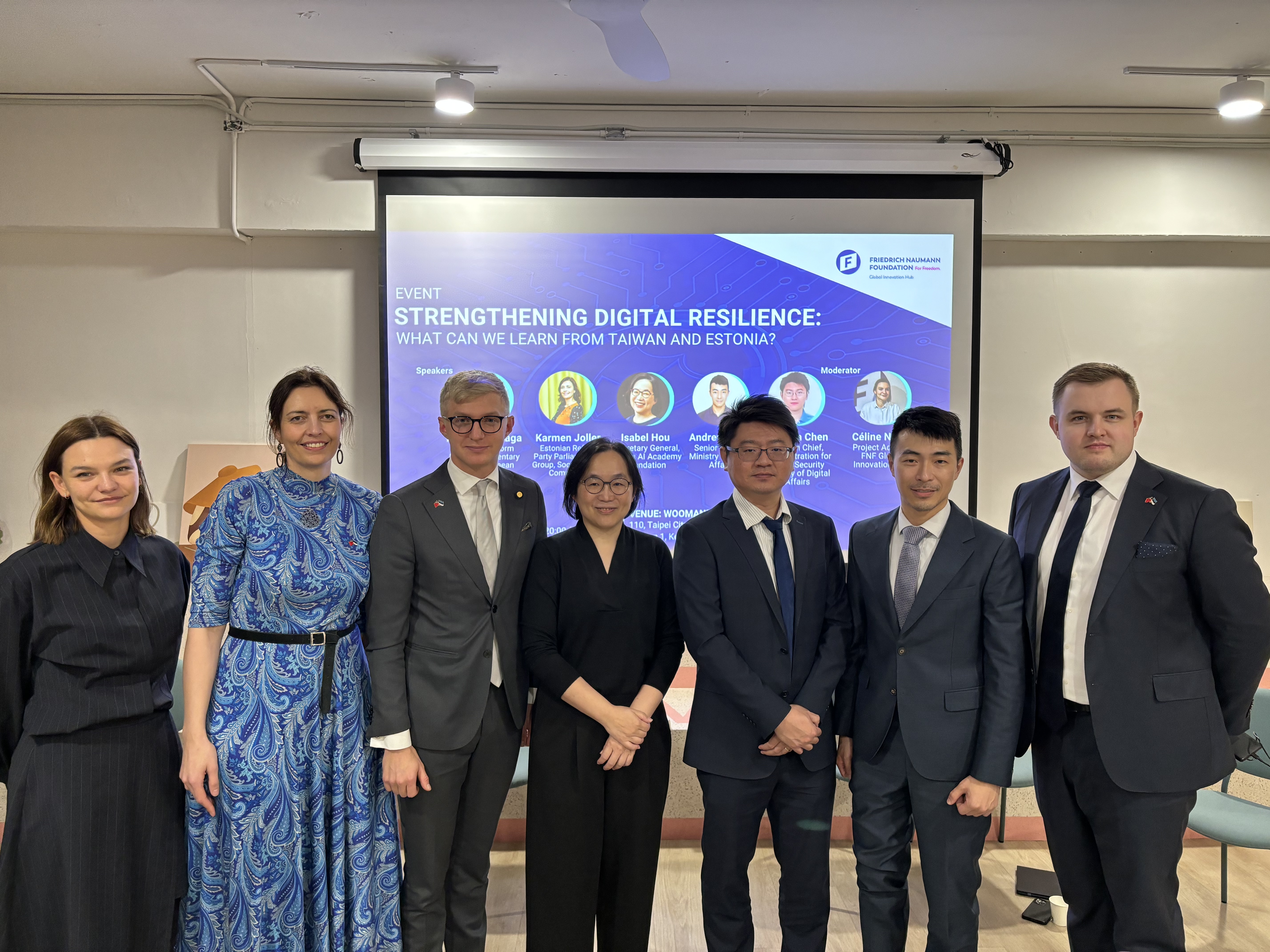Event
Digital Resilience of Taiwan and Estonia: Empowering Citizens and Boosting Global Collaboration amid Authoritarian Challenges

The Friedrich Naumann Foundation for Freedom Global Innovation Hub (FNF Global Innovation Hub) held an event titled "Strengthening Digital Resilience: What Can We Learn from Taiwan and Estonia?" on March 7th.
The event speakers included Estonian Reform Party Parliamentarians Kristo Enn Vaga and Karmen Joller, Isabel Hou from the Taiwan AI Academy Foundation, and representatives from the Ministry of Digital Affairs, Sz-Han Chen and Andrew Wang. The event was moderated by FNF Global Innovation Hub Project Advisor, Céline Nauer.
Adhering to the Chatham House Rule, below are highlights from the meeting:
Taiwan and Estonia, both aware of their unique geopolitical challenges, have prioritized strategies against disinformation and cyber threats, placing a strong emphasis on digital resilience. The dialogue during the event underscored the critical role of both the public and private sectors in combating cyberattacks and the need for international cooperation among democratic allies facing authoritarian pressures.
Central to their approach is the empowerment of individuals through enhanced cybersecurity awareness, positioning well-informed citizens as the foundation of a secure digital society. This event reaffirmed the necessity of global collaboration in bolstering cyber defenses and fostering a secure, informed, and resilient international community.

Estonia's Cybersecurity Initiative: Education and International Cooperation
In 2007, Estonia became the first nation to experience a recorded cyber-attack by another country, with Russia launching a DDoS attack targeting the Estonian Reform Party's website. This incident underscored the continuous threat of cyber warfare and the critical need for robust cyber security measures.
Recognizing the importance of resilience in the digital domain, Estonia has since prioritized the development of comprehensive cybersecurity strategies, emphasizing the importance of preparing the entire society, not just the military, for cyber threats. This approach includes advocating for early education in cyber hygiene, coding, security programming from middle school, as well as enhancing media literacy among younger citizens.
The initiative aims to cultivate a digitally savvy population equipped to protect themselves online. Estonia's focus on societal preparedness serves as a model for other nations seeking to bolster their technological resilience against cyber threats.
In addition, Estonia's advocacy for Ukraine's NATO inclusion exemplify their proactive stance in fortifying alliances and sharing knowledge worldwide. This approach not only bolsters both Ukraine and Estonia’s defensive capabilities but also extends their diplomatic reach, showcasing the significance of international partnerships in combating cyber threats and safeguarding sovereignty.
Taiwan's Cybersecurity Response to Rising Threats: T-Road and ZTA
Notably, during high-profile events such as U.S. Speaker Nancy Pelosi's visit in 2022, Taiwan experienced intensified cyber aggression, including DDoS attacks and the defacement of digital infrastructure.
The government's response involved the Cybersecurity Task Force's deployment and the implementation of new mandates for agencies to enhance resilience against such threats, with a significant emphasis on leveraging Content Delivery Networks (CDN).
Inspired by Estonia's X-Road, the Taiwanese government build the data transfer system “T-Road,” combined with encryption, certification for data access, and blockchain for added security. This approach ensures secure and efficient public sector data transfer.
Other measures including the Zero Trust Architecture (ZTA) framework, which unlike the traditional perimeter-based security, it instead focusing on potential internal threats. It operates based on the assumption that no entity within the network should be automatically trusted, and each connection requires re-authentication, even for verified users. This system includes three-stage verification: identity proof, device integrity, and behavior analysis.
Bridging the Cyber Security Gap: Empowering People in the AI Era
As artificial intelligence (AI) reshapes the cybersecurity landscape, the gap between technological advancements and human capabilities widens. Malicious actors leverage AI more swiftly than those defending against them, exploiting these technologies for nefarious purposes.
This shift underscores the critical role of human elements in cybersecurity resilience, acknowledging that new technologies and infrastructure alone are insufficient. Missteps by users can introduce significant vulnerabilities. Educating the broader population about AI and its potential risks is essential for fostering a culture of cyber resilience.
To bridge this gap, Taiwan AI Academy Foundation launched a re-skilling initiative, educating over 10,000 participants on AI's uses and risks, expanding its reach to include non-technical individuals.
Highlights from the Q&A session
Combating Disinformation: The speakers cited examples of disinformation, such as vaccine conspiracy theories and contents made with deepfake, highlighting that disinformation can endanger human lives, erode public trust, and undermine the foundations of democratic systems. Democracies, including Taiwan, and non-governmental actors must strengthen their collaboration on fact-checking and combating disinformation.
TikTok Issue: The discussion revolves around concerns regarding TikTok's influence on the youth and its role in spreading propaganda, particularly in Taiwan's last election. Both Estonia and Taiwan have cautioned against the use of Chinese-funded software like TikTok to safeguard its digital realm.
While outright banning TikTok poses challenges, especially in democracies, speakers acknowledged the importance of communicate with the public regarding potential challenges brought by applications as such. The discussion also underlined the delicate balance between ensuring national security while respecting individual freedoms in the digital era.
Freedom of Speech, and Cancel Propaganda Channels: During the discussion, speakers acknowledged the importance of freedom of speech as a cornerstone of democracy but also recognizes issues brought by problematic content. Policy recommendations mentioned during the discussion including the need for regulations to prevent hate speech and propaganda that can divide the society and post threats on the national security. The challenge lies in implementing such regulations without stifling legitimate free expression, highlighting the need for a nuanced approach that protects democratic values while curbing malicious disinformation and propaganda efforts. Speakers also mentioned that propaganda channels undermining democracy and spreading harmful narratives should be banned, citing the political propaganda preceding Russia's attack on Eastern Ukraine as an example. For instance, Estonia has banned Russian technology and software deemed a national security threat.
